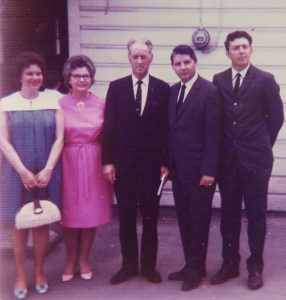
“Let not your heart be troubled; you believe in God, believe also in Me.In My Father’s house are many mansions;if it were not so, I would have told you. I go to prepare a place for you. And if I go and prepare a place for you, I will come again and receive you to Myself; that where I am, there you may be also” (John 14:1-3 NKJV).
The older you get, the more you realize that author, Thomas Wolfe, got it right when he said, “You can’t go home again.”
That’s what the old song, “Rank Strangers to Me,” written by Albert E. Brumley of Powell, Missouri, in 1942, was about. The lyrics describe a man’s visit to his childhood home where he could no longer find anyone that he recognized. Everywhere he looked around his old home place, the people he met seemed to be “rank” (“complete”) strangers to him, “no mother or dad, not a friend” did he see.
The song was included in a Stamps-Baxter gospel songbook that my mother and her gospel quartet often used. The name of her group was the Willow Branch Quartet, named after the Willow Branch Baptist Church which my great, great grandfather planted and where I was later baptized. The original group included my teenage mother, Wilda Dillon, singing lead; her mother, Ettie Dillon, alto; J. C. Leonard (the barber who gave me my first haircut), tenor; and Harold Shaffer, bass. The first three members formed the core of the group for nearly 40 years. But Shaffer, the original bass singer died and was replaced by several bass singers through the years. Among them was Howard Overbey and finally, during the last 20 years of the group, Tommy Hall (my 7th grade history teacher), who in addition to his bass voice, also played piano and guitar. As the group moved from its acapella origins, it also added another guitarist, my Uncle Ralph Bays.
The quartet was based out of Bristol, Virginia and was well-known at churches and radio stations throughout the surrounding states of Tennessee, North and South Carolina, West Virginia and Kentucky. They recorded several 78s, albums, and 45s through the years. They were often heard singing live on the WFHG radio station in downtown Bristol on Sunday afternoons.
According to Ralph Stanley’s autobiography, it was on one of these Sunday afternoons that he and his brother, Carter, drove through Bristol and first heard the song, “Rank Stranger” on the radio, being sung by my mother and the Willow Branch Quartet.
I was actually contacted by one of Stanley’s book researchers a few years ago about this very story. I was able to confirm to him that my mother had recorded “Rank Strangers” in 1955 (on an old 78) and that her quartet was often asked to sing the song.
Here is what Stanley’s autobiography says about this:
“I remember back in the fifties, we heard a gospel group called the Willow Branch Quartet. They played around the Bristol area… We were driving to a show, listening to the radio, when we heard the Willow Branch Quartet doing a song called “Rank Stranger.” There was something there that grabbed Carter and me. We’d never heard that term “rank stranger” before. The song was all about feeling a stranger in this world, even with your own family and friends and neighbors, and how the next world would make all that right… I reckon it became the most popular song the Stanley Brothers ever sung” (Ralph Stanley, Man of Constant Sorrow: My Life and Times, Penguin Books, 2009, p. 384).
I was able to attend a Ralph Stanley concert in Rocky Mount, North Carolina in October of 2013. I got him to sign his autobiography and I gave him a CD of some of my mother’s recordings, including “Rank Stranger.” He thanked me and handed it to his son, saying, “Here, put this on the bus. We’ll play it on the way home.”
“Home.” That’s where my mother, my grandmother, my uncle and everyone else in the Willow Branch Quartet are now. They are at home in heaven with the Lord Jesus. He’s the One who has prepared a place for all those who believe in Him.
And this is why when I go “home” to Bristol, things just aren’t the same. Here are the lyrics and a recording of the Willow Branch Quartet doing “Rank Stranger.”
I wandered again
To my home in the mountains
Where in youth’s early dawn
I was happy and free.
I look for my friends,
But I never could find ’em.
I found they were all
Rank strangers to me.Everybody I met
Seem to be a rank stranger;
No mother or dad,
Not a friend could I see.
They knew not my name
And I knew not their faces —
I found they were all
Rank strangers to me.“They’ve all moved away,”
Said the voice of a stranger,
“To that beautiful shore
By the bright crystal sea.”
Some beautiful day
I’ll meet ’em in Heaven
Where no one will be
A stranger to me.Everybody I met
Seem to be a rank stranger;
No mother or dad,
Not a friend could I see.
They knew not my name
And I knew not their faces —
I found they were all
Rank strangers to me.











 Leading Kids to Jesus: How to Have One-on-One Conversations about Faith
Leading Kids to Jesus: How to Have One-on-One Conversations about Faith





